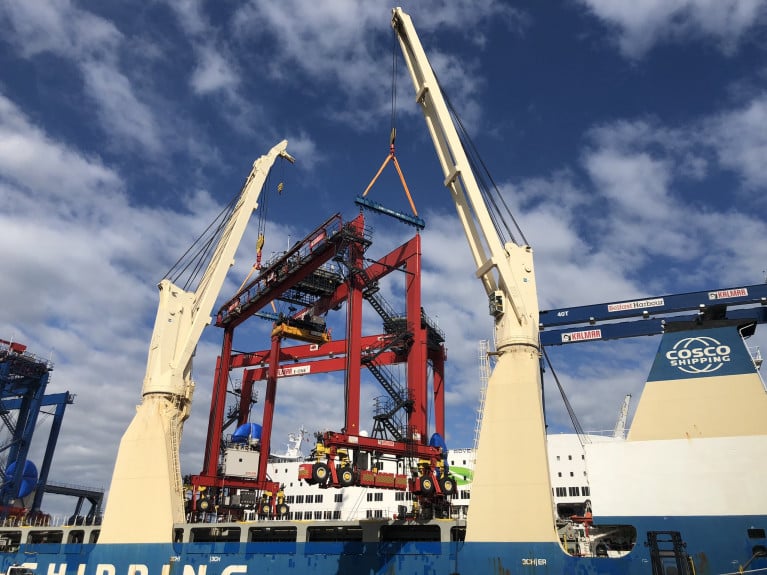Displaying items by tag: VT3 terminal (ICG)
Chinese Heavy-Lift Completes Discharge of RTG Cranes at Dublin Port Now its the turn of Belfast Harbour
A Chinese flagged heavy-lift ship which called to Dublin Port to unload a pair of rubber tyred gantry (RTG) container cranes has since departed and arrived to Belfast Harbour this morning to unload a further three, writes Jehan Ashmore.
Afloat tracked the heavy-lift ship along with accompanying Svitzer tugs in Belfast Harbour. This saw Svitzer Surrey (at the bow) while Svitzer Sussex assisted at the stern.
As also previously reported Da Ji's delivery project cargo of 'straddle-carriers' to Dublin Port was inaccurate, despite information sourced from various relevant bodies within the port company's estate. In fact the part-cargo as mentioned above were Kalmar built RTG's which are to be used at Irish Continental Group (ICG)'s container divsion, Dublin Ferryport Terminal (DFT) a 32-acre site leased from DPC and located on the north side of the port close to ICG's Irish Ferries terminal.
Afloat still awaits a response from ICG on further details on the container terminal's new infrastructure, as they were not necessarily loaded on board Da Ji's last port of call prior to Irish waters, Oran in Algeria, north Africa. Perhaps these cranes came from China?
Of the original five of RTG's which Afloat tracked on the Da Ji's arrival to Dublin Port on Wednesday, the remaining three are due to be discharged in Belfast Harbour where ICG also operate their Belfast Container Terminal (BCT) division located at Victoria Terminal 3 (VT3).
BCT operate's this sole container terminal at Belfast Harbour under a services concession agreement with Belfast Harbour Commissioners (BHC).
The 27 acre-site likewise of it's Dublin counterpart, is located on the north side of Belfast Port's estate. In addition both terminals, BCT and DFT are served by ICG's other container division EUCON whose 'feeder' containerships connect Belfast and Dublin with the major northern European mainland hub-ports of Antwerp and Rotterdam.
According to ICG's website, BCT's container compound comprises of 3 ship-to-shore (STS) gantry cranes, 3 rail-mounted gantry cranes and also the same number of straddle carriers.
The installation of the RTG's is part of a £40m container infrastructure upgrade at VT3 as Afloat previously reported. The three-year investment programme will see Belfast Harbour invest £28m in ten new cranes and undertake major civil works to reconfigure the terminal. This will enable the terminal to increase capacity by around 30% and improve terminal efficiency.
In total there are 250 sailings annually between Belfast and the ports in Belgium and The Netherlands and according to the port calls also to Le Havre, France. Last year VT3 handled almost 128,000 containers, a 1.5% increase on the previous year and the highest volume since 2010.
The work at VT3 (which opened in 1993) is amongst the largest investments undertaken and according to the port will lead to the most modern container handling terminals of its size in Europe.
As Afloat reported last month (see photo caption), a pair Ship to Shore (STS) cranes manufactured by Liebherr Cranes were delivered to the VT2 for assembly before moved across the River Lagan where the VT3 terminal is located.
According to Belfast Harbour last year, these RTG's also from Kalmar, which will make for faster and more versatile operations than the current yard cranes. In addition be operated remotely, further increasing productivity. Then it was also reported that the first five of 8 RTGs will be delivered in November and with the first pair of RTGs ready for use in early Q1 of this year.
This morning also in Belfast Harbour, Afloat tracked the Chinese built second newbuild Stena E-Flexer series ropax ferry Stena Edda which entered service this year on the Belfast-Birkenhead (Liverpool) service. Stena's terminal in the port for the 'Liverpool' route is based at VT2 whereas those for Cairnryan (Loch Ryan Port) are based downriver at VT4.
As for the unloading of the heavy-liftship, Da Ji, progress in the discharging operations is subject to weather with the ship scheduled to depart Belfast Harbour by tomorrow evening.





























































